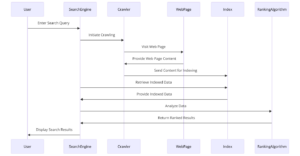
Welcome to the Beginner’s Guide
to SEO!
Do you want to show up on the first page of Google? Whether you’re starting a blog, launching a business, or simply curious about how search engines work, understanding SEO (Search Engine Optimization) is crucial for your online success.
In this guide, I’ll walk you through the fundamentals of SEO clearly and straightforwardly.
What is SEO?
SEO stands for Search Engine Optimization. It’s the process of optimizing your website to increase its visibility and rankings in search engine results pages (SERPs) like Google, Bing, and Yahoo. Why does this matter? Well, think about how you usually find information online.
You probably type a few words into a search engine and click on one of the top results. That’s the power of SEO in action—it helps your website appear in those top results when someone searches for keywords related to your content.
Why is SEO Important?
Let’s look at some stats to understand the importance of SEO:
- 93% of all online experiences begin with a search engine. This shows how critical it is for your website to rank well.
- 75% of users never scroll past the first page of search results. If your website isn’t on the first page, you’re missing out on potential visitors.
- 61% of marketers say improving SEO and growing their organic presence is their top inbound marketing priority.
These numbers highlight why mastering SEO basics can make a significant impact on your website’s traffic and business success.
How Search Engines Work

To understand SEO, you need to grasp how search engines operate. Here’s a simplified explanation:
- Crawling: Search engines use automated bots (called crawlers or spiders) to browse the web and discover content. These bots follow links from one page to another and collect information about each webpage they visit.
- Indexing: After crawling, search engines organize and store the information they find in databases (known as indexes). This process makes it possible for search engines to quickly retrieve relevant pages when someone enters a search query.
Ranking: When you perform a search, the search engine analyzes its index to deliver the most relevant and useful content. Ranking factors such as keyword relevance, content quality, and authority determine where a webpage appears in the search results.
What are the Key Elements of SEO?
Now, let’s take a deeper dive into the essential elements of SEO that you need to understand:
1. Keywords
Keywords are the words and phrases people type into search engines to find information. Effective keyword research involves identifying relevant keywords for your business and understanding their search volume and competition. Tools like Google Keyword Planner, SEMrush, or Ahrefs can assist you in finding the right keywords to target.
2. On-Page SEO
On-page SEO refers to optimizing individual web pages to rank higher and earn more relevant traffic in search engines. Key on-page SEO factors include:
- Title Tags: These are HTML elements that specify the title of a web page. They appear in the browser tab and as the headline in search engine results.
- Meta Descriptions: A meta description is a brief summary of what the page is about. It appears below the title tag in search engine results and should be compelling to encourage clicks.
- Headings (H1, H2, H3): These headings structure your content and make it easier for both users and search engines to understand your main points.
- Content Optimization: Creating high-quality, relevant content that satisfies user intent and incorporates targeted keywords naturally is crucial for on-page SEO.
1. Off-Page SEO
Off-page SEO focuses on activities outside your website that influence your search engine rankings. Key off-page SEO factors include:
- Backlinks: Links from other websites to yours are like votes of confidence. Quality backlinks from authoritative sites can significantly boost your SEO efforts.
- Social Signals: While not a direct ranking factor, social signals (shares, likes, comments) can indirectly impact your SEO by increasing visibility and traffic to your content.
2. Technical SEO
Technical SEO involves optimizing the technical aspects of your website to improve its crawlability, indexability, and site speed. Key technical SEO factors include:
- Site Structure: Ensuring your website has a logical structure that makes it easy for users and search engines to navigate.
- Mobile-Friendliness: With the majority of internet users browsing on mobile devices, having a mobile-friendly website is essential for both user experience and SEO.
- Page Speed: Faster-loading pages not only enhance user experience but also contribute to higher search engine rankings.
3. User Experience (UX)
User experience plays a crucial role in SEO. Search engines like Google prioritize websites that provide a positive user experience. Factors that impact UX include:
- Easy Navigation: Users should be able to find information on your site quickly and intuitively.
- Readability and Accessibility: Ensure your content is easy to read and accessible to all users, including those with disabilities.
How to Get Started with SEO
Now that you understand the basics of SEO, here are some actionable steps to get started:
- Set Clear Goals: Determine what you want to achieve with SEO. Whether it’s increasing website traffic, generating leads, brand awareness or boosting sales, defining your goals will guide your SEO strategy.
- Keyword Research: Conduct thorough keyword research to identify relevant keywords for your business. Focus on keywords with a good balance of search volume and competition.
- On-Page Optimization: Optimize your web pages for your target keywords. Remember to create high-quality, valuable content that addresses the needs of your audience.
- Build Quality Backlinks: Earn backlinks from reputable websites in your industry. Focus on quality over quantity, as quality backlinks can significantly impact your search engine rankings.
- Monitor and Adapt: SEO is an ongoing process. Monitor your rankings and traffic regularly using tools like Google Analytics and Google Search Console. Adapt your strategy based on performance data and algorithm updates.
Final Thoughts
Congratulations! You now have a solid understanding of the basics of SEO. By implementing these strategies and staying updated with SEO best practices, you’ll be well on your way to improving your website’s visibility and driving organic traffic. Remember, SEO is not a one-time effort but a continuous process of optimization and refinement.
If you’re looking for expert guidance and personalized SEO services to take your website to the next level, consider partnering with Wambui Njuguna, an SEO expert with almost a decade of experience in helping businesses show up on Google. Contact us today to discuss how we can help you achieve your SEO goals!
Ready to boost your website’s visibility and drive more traffic? Contact Wambui Njuguna for expert SEO services tailored to your business needs. Whether you’re a small business owner, blogger, or entrepreneur, let’s work together to maximize your online presence through effective SEO strategies. Don’t wait—take the first step towards SEO success today!

Leave a Reply